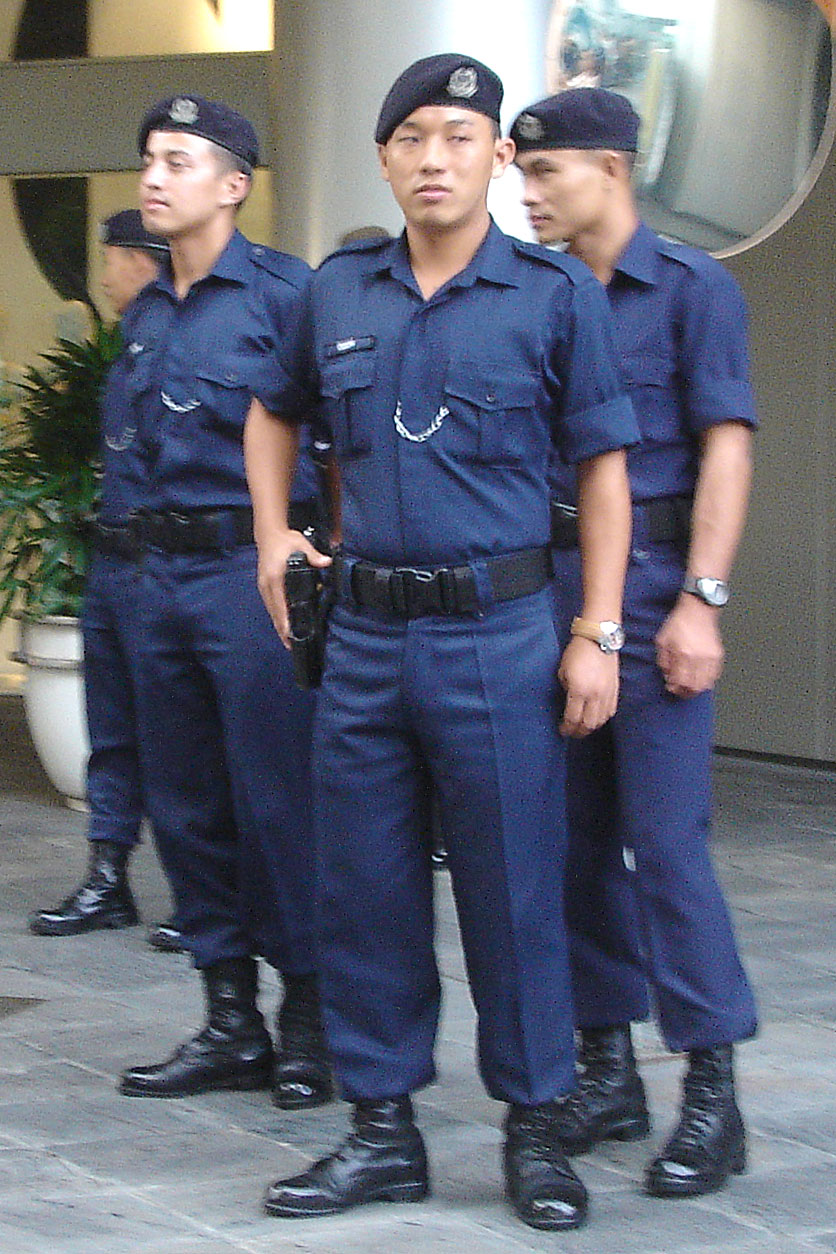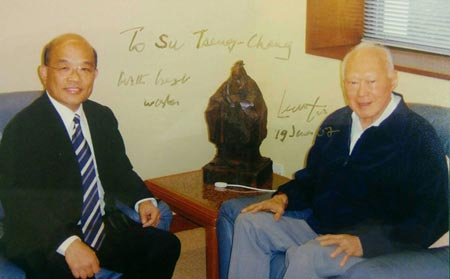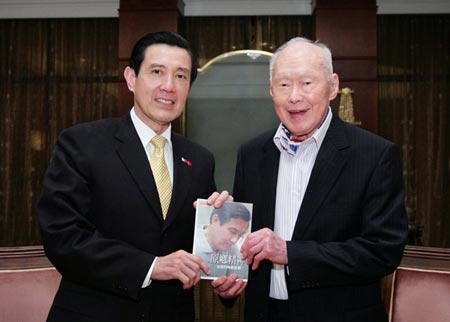by Tumin
語言:
English /// 中文
Photo Credit: Presidential Office
IN MAY 2006, the Taiwanese community in Singapore had to endure a one hour boat ride to an island off Singapore near Batam, Indonesia, to dine with then-Taiwanese President Chen Shui-bian. Was it because Chen was holding a meeting in Indonesia? No, it was because Singapore did not allow Chen to transit to the city-state for fear of “provoking” China. Chen had been criticized heavily for his alleged blunt declarations in favor of Taiwan’s independence, and Singapore sought to avoid any hint it approved of such sentiments. That incident begs the question of, if Chen could not set foot on Singapore soil, why was Ma feted in his visit the following year later when he was merely the mayor of Taipei?
Why was Singapore Chosen as the “Neutral Ground” For the Meeting?
ONE OF THE advantages of holding the meeting in Singapore is that both Singapore and China are authoritarian states. Protesters advocating independence for Taiwan, Tibet, or East Turkestan will not be able to attend, since such demonstrations are against the law in Singapore and would draw police crackdowns.
It is also important to note that the past “One China, Two Interpretations” framework came out of a meeting in Singapore. From April 27 to April 29, 1993, the summit between Wang Daohan and Koo Chen-fu took place in Singapore, marking the first public meeting to take place between high-level political figures from both sides of the Straits since 1949, albeit by way of a meeting of the leaders of what were technically two non-governmental organizations. The meeting established an institutionalized cross-straits negotiation mechanism based on the One China principle and ended the “Three No’s” policy set forth by President Chiang Ching-kuo in 1979.:
“Three No’s: No contact, no compromise, and no negotiation. The Republic of China under any circumstance will not have any negotiations with the Chinese Communist Party and absolutely will not give up on reclaiming mainland China, and the sacred duty of liberating our comrades. This position absolutely will not change.”
 Singaporean police. Photo credit: Huaiwei/WikiCommons
Singaporean police. Photo credit: Huaiwei/WikiCommons
Indeed, according to Ma Ying Jeou, the Singaporean government was proud of its role in brokering the 1993 talks between Wang Daohan and Koo Chen-fu, and it carefully preserved the conference room where the talks took place. Yet, out of the array of possible factors behind the decision to holding the meetings in Singapore, it is useful to explore the complex relations between Singapore and different political parties in Taiwan. Singapore, known for its pro-China stance, has treated Taiwan under different administrations differently. This reveals where Singapore’s own priorities are in serving as a site for the meeting.
Singapore’s Ties with the KMT
PERHAPS IT often is through informal channels that the networks of power operate. In this sense, another reason why Singapore is a good location for the Xi-Ma summit is on the basis of Singapore’s close ties with both China and the KMT.
Singapore’s history of operating as an intermediary between Taiwan and China goes back to 1993, in which China’s Association for Relations Across the Taiwan Straits (ARATS) chairman Wang Daohan and Taiwan’s Straits Exchange Foundation (SEF) chairman Koo Chen-Fu met in Singapore under the presiding auspices of Lee Teng-Hui, then president of Taiwan. ARATS and SEF are both technically NGOS, but operate as semi-official bodies to conduct negotiations under the Chinese and Taiwanese governments respectively when it is that both states do not have formal relations with each other.
If it was that Lee Teng-Hui had close ties to Singapore in the early 1990s, seen as he was as a potential broker of cross-straits peace by the Singaporean government, it was that the Chen Shui-Bian administration was later seen by Singapore as destabilizing of regional stability. Yet in efforts to resolve the situation as they saw fit, in 2004, during the Chen presidency, Singapore’s Prime Minister Lee Hsien Loong would visit Taiwan, provoking Beijing’s anger after he offered subsequently to mediate talks between Taiwan and China. At that point, Beijing angrily declined his offer to mediate, claiming that there was no need for Singapore to act as a go-between. The incident was in fact damaging of relations between Singapore and China, with Beijing canceling planned visits to Singapore by Chinese officials and business deals.
Perhaps in reaction to Chen’s pro-independence rhetoric, the Singaporean government would thus cultivate ties with Ma Ying-Jeou, then-mayor of Taipei and a rising political star. Probably coming out of ties established during Lee Hsien Loong’s 2004 visit, in which Lee met with then-KMT chairman Lien Chan, Ma Ying-Jeou would visit Singapore while presidential candidate of the KMT in 2007. Ma would be praised by Singaporean founding father Lee Kuan Yew himself during his time as presidential candidate.
So, then, if it was a surprise that after the Lee Kuan Yew’s death that Ma Ying-Jeou would fly to Singapore unannounced, it really should not have been so surprising. This was the first time, also, that during the course of his presidency Ma visited a country with official relations with China. No doubt, in retrospect, we can see that Ma’s visit to Singapore was in some sense probably in preparation for present events. What more, China’s unusual solemnity with regards to this incident makes this chain of events seem even more bizarre.
Singapore and China
SINGAPOREAN founding father Lee Kuan Yew had always been supportive of China, and this relationship seemed to be mutual. Famously known for his strong stance in safeguarding “Asian values”, which really is the idea of autocracy dressed in a fancier term, China has applauded Lee in this fight against Western dominance. If there is one country, of a certain similar blood lineage with China that shares similar values, it will only be Singapore. It is also interesting to note that despite being both colonies of the British Empire, Hong Kong seems to resonate less with China than does Singapore on the basis of its tradition of freedom of speech and freedom of press.
Seeing as Lee has been seen by western observers as a wise leader, well respected by Western democratic countries in spite of his autocratic nature on the basis of having led Singapore to economic success, Lee’s comments and views on China has been held with high regards. And we might do well to note Lee’s words in the sense that his specter still seems to be dictate much of the worldview of the Singaporean government.
Lee strongly believed that China’s ascendence as the global powerhouse is inevitable, and this would not have been possible without the help of the US bringing China into the international community. Furthermore, Lee believed that China’s significant military build up is meant to deter US intervention in Taiwan. But it may be significant to note that Lee believes China does not wish for war not because of its considerations of the great economic cost, but because such war would mean that Chinese will be killing fellow Chinese. Again, this may be a subtle message affirming a certain ethnic claim China has over Taiwan.
However, it may actually that Singapore is itself wary of China’s own capacity to ethnic claims upon Singapore as it leverages such claims upon Taiwan and these claims could possibly be seen as extending to Singapore on the basis of its 74.3% ethnic Chinese population. Because of the small size of Singapore as a city-state, the Singaporean military lacks land to train on. Despite the offers of the Chinese military to let it borrow facilities to train on in Hainan, Singapore prefers to operate military bases in Taiwan and to carry out training exercises in Taiwan. Taiwan has the land for the Singaporean military to train on, but would not be a possible military threat to Singapore in the way that China is. So it is that Singapore trains its troops in Taiwan instead.
Singaporean foreign policy towards Taiwan is ironic, then, given that the other parallel between Singapore and Taiwan is that as a city-state and small island country respectively, both face the dilemma of attempting to maintain sovereignty from the much larger neighbors that surround both countries.
Singapore and Chen Shui-Bian
TAIWAN HAS NOT been a democracy long enough to go through enough elections cycles where we have different presidents from different parties. As of now, KMT has been in presidency for the longest period of time, with the DPP being in power for only 8 years under Chen Shui-bian. During the 8 years of Chen’s administration, cross-straits tension was high. Singapore’s Prime Minister Lee was quick to be very critical with Chen. In his September 11, 2008 speech to the U.S.-Taiwan Business Council, Lee criticized President Chen for being a “gambler” since he has lost all political credibility with his corruption scandal, and therefore, left with nothing to lose. Using Chen as the perfect platform to cosy up to China by criticizing his pursuit of independence, Lee has often warned not just Taiwan, but also the international community of the dire consequences Taiwan will face if it were to “provoke” China.
In 2004, Singapore’s Foreign Minister George Yeo made a speech in the UN claiming that actions by Taiwan’s independence groups could lead to war with China. This was met with backlash by Ministry of Foreign Affairs Mark Chen, leading to him to notoriously criticize Singapore: “Even a tiny garden country like Singapore, a country the size of a piece of snot which only has 3 million people, can criticize Taiwan at the United Nations,” and “Singapore holds China’s balls with its hands, if I may use these ugly words.”
Before the Beijing Olympics, Lee once again made comments suggesting that the world community values peace, stability and growth more than it values Taiwan. During separate meetings with Frank Hsieh and Su Tseng-chang, he found it “unbelievable” that they held such “antipathy, hatred, and revulsion” towards China.
 The DPP’s Su Tseng-Chang (left) meeting with Lee Kuan Yew (right). Photo credit: Office of Su Tseng-Chang
The DPP’s Su Tseng-Chang (left) meeting with Lee Kuan Yew (right). Photo credit: Office of Su Tseng-Chang
For a smart man like Lee, if he no doubt realizes that China is belligerently claiming sovereignty over Taiwan, militarily, as such, how can it not invoke hatred and revulsion from Taiwanese? Unless, of course, he believes that Taiwan is an inalienable part of China for its “Chinese” lineage, then past statements by Lee are just empty rhetoric.
An incident which may be illustrative of Lee’s empty rhetoric in this regard which is rumored to have happened was when the Taiwanese representative to Singapore during the Chen administration, in response to warnings by Lee that Chen needed to stop being so blunt, stated “So do you wish for us to unify with China then?” Lee was stunned and had no response. But this goes to show how Lee’s words were just empty rhetoric. In reality it is that Singapore is caught between the positions of criticizing Taiwan’s demand for independence, not exactly wanting Taiwan to become part of China, while also not wanting Taiwan to excessively provoke China either. Perhaps this is what has made the KMT a natural ally for the Singaporean government.
Singapore and Ma Ying-Jeou
WHEN IN 2007 Taipei Mayor Ma Ying-jeou was granted entry and exit on Singapore’s soil, Chen was not allowed to visit Singapore. Fast forwarding to 2008, when asked about Ma’s prospects in the 2008 presidential election, Lee Kuan Yew responded by saying that Ma is young and not corrupt, though the son of a mainland family and born in Hong Kong, Ma has no emotional bond with China, and a vote for him would be one way Taiwanese could moderately express a distinction between themselves and China. It would seem that Lee’s aim was to find some kind of balance between Taiwan and China which would be suitable for Singapore’s relations with both, though with eventual reunification still on the agenda. Ma probably fit the bill where Lee was concerned, in terms of his planned policies towards China.
What is the most obvious bias shown by Singapore towards Ma, then? It will nonetheless be the fact that both sides signed the ASTEP (Agreement between Singapore and the Separate Customs Territory of Taiwan, Penghu, Kinmen and Matsu on Economic Partnership) under the framework of the WTO in November 2013. Here, Taiwan’s trade isolation problem with Singapore seems to be resolved under Ma, because earlier in 2000, the Chen government was unwilling to concede to signing an agreement under a name that compromises Taiwan’s sovereignty. In that specific case, Singapore was worried that Chen would use an FTA with Singapore to bolster claims of Taiwan sovereignty, and this, would definitely hurt relationships between Singapore and China. So, what led Singapore agree to an FTA with Taiwan?
 Ma Ying-Jeou (left) and Lee Kuan Yew (right). Photo credit: CNA
Ma Ying-Jeou (left) and Lee Kuan Yew (right). Photo credit: CNA
In May 2008, then-Minister Mentor Lee Kuan Yew said in an interview with Taiwan’s Central News agency: “Singapore will only be able to sign an FTA with Taiwan if Taiwan improves its relations with China.” That was leverage. In fact, before the negotiations of ECFA begin, Beijing officials tended to avoid commenting on Taiwan’s pursuit of FTAs with other countries. However, after ECFA was signed, Beijing officials started to use ECFA as an accelerator in Taiwan’s quest for other FTAs, inferring that in order for Taiwan to integrate into this world, it must first go through Beijing―and Singapore was sure to affirm this message. Most importantly, Ma’s appearance in Singapore at Lee’s death in March earlier this year, despite not being allowed to attend his funeral, seems to show the close relationship he had shared and maintained with Singapore, made possible by certain shared political views.
This was early in Ma’s administration. And if Ma was ready to compromise Taiwan’s sovereignty at the start of his term in 2008, what can we interpret from his decision to meet Xi near the end of his tenure?
Conclusion
IT IS CLEAR that Singapore has always been “friendlier” towards Ma than any other political figure since the dawn of Taiwan’s electoral democracy. Furthermore, Singapore provides the perfect political climate for a highly sensitive political meeting, as it would be embarrassing for China to have to deal with protestors from a place it claims as sovereign territory. Xi will no doubt be satisfied that this meeting will be the calmest cross-strait meeting held to date. This is the historically important role of Singapore in assisting the warming of ties between both sides, which has made it a crucial location for such meetings.
The last such meeting was in 1993, which ended Chiang’s “Three No’s” policy. Will it be that this meeting marks the end of Ma’s “Three No’s” of “No Unification, No Independence, and No War”?




